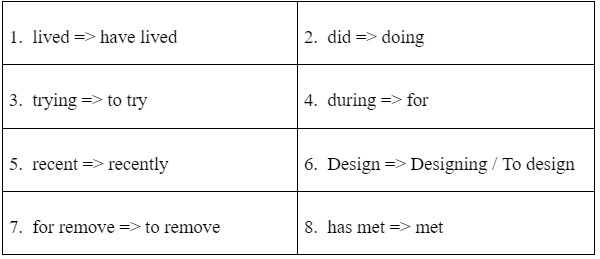Grammar - Unit 5: Inventions - SBT Tiếng Anh 10 Global Success
1. Choose the best answers to complete the sentences. 2. Complete the sentences using the correct forms of the verbs in brackets.3. There is a mistake in each sentence. Find and correct it.
III. Grammar
1. Choose the best answers to complete the sentences.
(Chọn các câu trả lời đúng nhất để hoàn thành các câu.)
1. The door and the window are open. I think someone________ into our house!
A. breaks B. broke C. has broken D. will break
2. Jane________ Chinese, but she quitted because it was too difficult.
A. studies B. studied C. has studied D. will study
3. Dave ________ Chinese for six years now. He likes it.
A. studies B. studied C. has studied D. will study
4. We have worked here ________ 2002
A. for B. since C. In D. to
5. The company ________ a new kind of smartphone. It looks fantastic!
A. just introduces
C. has just introduced
B. just introduced
D. will just introduce
6. Hoa is not coming to class today. She ________ back to her hometown
A. goes B. go C. has gone D. will go
7. She has had this smartphone________ 10 years.
A. for B. since C. from D. in
8. This is a delicious cake, but we have________ had a big dinner and feel very full.
A. only B. just C. since D. for
Phương pháp giải:
+ Cấu trúc thì hiện tại hoàn thành:
- Khẳng định: S + have/ has + Ved/P2
- Phủ định: S + have/ has not + Ved/P2
- Câu hỏi: (wh-word) Have/ Has + S + Ved/P2?
+ Dấu hiệu nhận biết: so far / many time / just/ already…; for + 1 khoảng thời gian; since + mốc thời gian
Lời giải chi tiết:

1.The door and the window are open. I think someone has broken into our house!
(Cửa ra vào và cửa sổ đang mở. Tôi nghĩ ai đó đã đột nhập vào nhà của chúng tôi!)
Giải thích: Thì hiện tại hoàn thành diễn tả một hành động, sự việc bắt đầu trong quá khứ và còn tiếp diễn ở hiện tại.
2.Jane studied Chinese, but she quitted because it was too difficult.
(Jane đã học tiếng Trung Quốc, nhưng cô ấy đã bỏ dở vì nó quá khó.)
Giải thích: Thì quá khứ đơn diễn tả một hành động, sự việc đã diễn ra tại một thời điểm cụ thể, hoặc một khoảng thời gian trong quá khứ và đã kết thúc hoàn toàn ở quá khứ.
3.Dave has studied Chinese for six years now. He likes it.
(Dave đã học tiếng Trung Quốc được sáu năm. Anh ấy thích nó.)
Giải thích: Việc Dave học tiếng Trung đã xảy ra trong quá khứ và hiện việc học ấy đang tiếp diễn. Dấu hiệu nhận biết “for six years” (đã được 6 năm). Vì vậy trong câu này ta dùng thì hiện tại hoàn thành.
4.We have worked here since 2002.
(Chúng tôi đã làm việc ở đây từ năm 2002)
Giải thích: since + mốc thời gian: từ khi
5.The company has just introduced a new kind of smartphone. It looks fantastic!
(Công ty vừa giới thiệu một loại điện thoại thông minh mới. Trông nó tuyệt vời!)
Giải thích: Dấu hiệu nhận biết: just (vừa mới) -> diễn tả hành động vừa mới xảy ra. Vì vậy, câu này chúng ta sử dụng thì hiện tại hoàn thành.
6.Hoa is not coming to class today. She has gone back to her hometown.
(Hôm nay Hoa không đến lớp. Cô ấy đã về quê)
Giải thích: Thì hiện tại hoàn thành diễn tả một hành động, sự việc bắt đầu trong quá khứ và còn tiếp diễn ở hiện tại.
7.She has had this smartphone for 10 years.
(Cô ấy đã có chiếc điện thoại thông minh này trong 10 năm.)
Giải thích: for + quãng thời gian: trong khoảng
8. This is a delicious cake, but we have just had a big dinner and feel very full.
(Đây là một chiếc bánh ngon, nhưng chúng tôi vừa có một bữa tối thịnh soạn và cảm thấy rất no.)
Giải thích: Thì hiện tại hoàn thành diễn tả một hành động, sự việc vừa mới xảy ra: sự việc “have just had” (vừa có một bữa ăn) đã vừa xảy ra trước thời điểm nói ít lâu.
Câu 2: (Bài 2)
2. Complete the sentences using the correct forms of the verbs in brackets.
(Hoàn thành các câu bằng cách sử dụng các dạng đúng của động từ trong ngoặc.)
1.Avoid (charge) ________the device for too long. It may overheat and break down.
2.It's very convenient(look) ________ up a new word on a smartphone when learning English.
3.Computers allow us (store) ________ a lot of information.
4.Robots help us (do) ________ difficult or dangerous tasks.
5.(Carry) ________ a laptop around is easy because it is often very light and small.
6.I decided (give) ________ my old laptop to my younger brother.
7.Some people hate (use) ________ technology.
8.My friends enjoy (learn) ________ English on their smart devices.
Lời giải chi tiết:

1.Avoid charging the device for too long. It may overheat and break down.
(Tránh sạc thiết bị quá lâu. Nó có thể quá nóng và hỏng.)
Giải thích: avoid + Ving: tránh làm gì
2.It's very convenient to look up a new word on a smartphone when learning English.
(Tra từ mới trên điện thoại thông minh khi học tiếng Anh rất tiện lợi.)
Giải thích: Cấu trúc: S + be + adj + to V
3.Computers allow us to store a lot of information.
(Máy tính cho phép chúng ta lưu trữ rất nhiều thông tin.)
Giải thích: allow + O + to V: cho phép ai làm gì
4.Robots help us do / to do difficult or dangerous tasks.
(Robot giúp chúng ta làm những công việc khó khăn hoặc nguy hiểm.)
Giải thích: help + O + Ving / to V: giúp ai làm gì
5.To carry / Carrying a laptop around is easy because it is often very light and small.
(Mang theo máy tính xách tay rất dễ dàng vì nó thường rất nhẹ và nhỏ.)
Giải thích: V-ing và to V đều có thể được sử dụng làm chủ ngữ đứng đầu câu.
6.I decided to give my old laptop to my younger brother.
(Tôi quyết định tặng chiếc máy tính xách tay cũ của tôi cho em trai tôi.)
Giải thích: decide + to V: quyết định làm gì
7.Some people hate using / to use technology.
(Một số người ghét sử dụng công nghệ.)
Giải thích: hate + Ving / to V: ghét làm gì
8.My friends enjoy learning English on their smart devices.
(Bạn bè của tôi thích học tiếng Anh trên thiết bị thông minh của họ.)
Giải thích: enjoy + Ving: thích làm gì
Câu 3: (Bài 3)
3. There is a mistake in each sentence. Find and correct it.
(Có một lỗi sai trong mỗi câu. Tìm và sửa nó.)
1. We lived here since 1990. We all enjoy living in this neighbourhood.
2. Have you finished did your homework?
3. They want trying the new device because it is very useful.
4. I have used this smartphone during 20 years. It is old now.
5. We have recent bought a new laptop.
6. Design a new invention is not easy.
7. I have tried everything but it is really difficult for remove this stain.
8. Everyone has met at the meeting yesterday and we had a great discussion.
Lời giải chi tiết:

1. We have lived here since 1990. We all enjoy living in this neighbourhood.
(Chúng tôi sống ở đây từ năm 1990. Tất cả chúng tôi đều thích sống trong khu phố này.)
Giải thích: Dấu hiệu nhận biết thì hiện tại hoàn thành “since + mốc thời gian”.
2. Have you finished doing your homework?
(Bạn đã làm xong bài tập chưa?)
Giải thích: finish + Ving: hoàn thành việc gì đó.
3. They want to try the new device because it is very useful.
(Họ muốn thử thiết bị mới vì nó rất hữu ích.)
Giải thích: want + to V: muốn làm gì
4. I have used this smartphone for 20 years. It is old now.\
(Tôi đã sử dụng điện thoại thông minh này trong suốt 20 năm. Bây giờ nó đã cũ.)
Giải thích: for + khoảng thời gian: trong khoảng
5. We have recently bought a new laptop.
(Gần đây chúng tôi đã mua một máy tính xách tay mới.)
6. Designing / To design a new invention is not easy.
(Thiết kế một phát minh mới không phải là dễ dàng.)
Giải thích: V-ing và to V đều có thể được sử dụng làm chủ ngữ đứng đầu câu.
7. I have tried everything but it is really difficult to remove this stain.
(Tôi đã thử mọi cách nhưng rất khó để loại bỏ vết bẩn này.)
Giải thích: Cấu trúc: S + be + adj + to V
8. Everyone met at the meeting yesterday and we had a great discussion.
(Mọi người đã gặp nhau tại cuộc họp ngày hôm qua và chúng tôi đã có một cuộc thảo luận tuyệt vời.)
Giải thích: Dấu hiệu nhận biết thì quá khứ đơn “yesterday” (ngày hôm qua).
Search google: "từ khóa + timdapan.com" Ví dụ: " Grammar - Unit 5: Inventions - SBT Tiếng Anh 10 Global Success timdapan.com"







